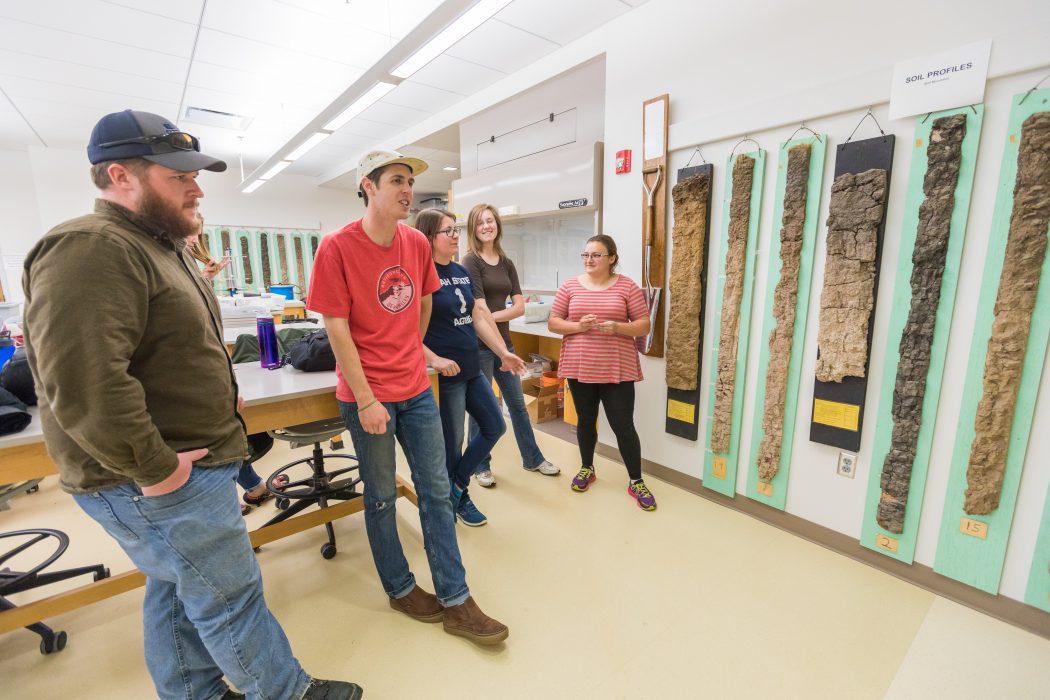USU Soils Judging Team heads to Nationals in Illinois
Ask any normal student what the dark brown earthy material on the ground outside is, and they will most likely tell you that it’s simply dirt or mud, but ask one of the five members of the Utah State University Soil Judging Team and they will tell you it is soil and it’s made up of more than just “dirt.”
The Soils Judging Team is currently participating in the National Competition held in DeKalb, Illinois. While they are there, they will be able to judge the physical/chemical aspects, morphology, profile characteristics, soil classification and site interpretation of samples, all in a pits of soils. The competition contains two parts: an individual component and a team component.
“Each team member has to practice for both components. At nationals, the team competition involves all five members working together. Four members of the team will compete in the individual portion, and one will be helping me, but they aren’t sure who will competing yet,” said John Lawley, a research associate who has coached the team since 2001.
This gives every team member the incentive to try and work harder to figure everything out.
“In the time that I have been coaching, this is my ninth year at Nationals. We have a good team, and they have been doing well. They have a willingness to work, and that’s what it takes to get there and participate, Lawley said.
Of course with any competition, there is a lot of preparation and effort required in order to do well.
Sandra Udy, an environmental soil and water science major said, “We practiced twice a week during fall semester, once a week this semester and even some Saturdays.”
In order to qualify for nationals, The team participated in an online regionals tournament earlier this school year.
“Each of the other schools participating sent us soils, and we were able to judge them that way,” Lawley said.
Past years of the competition have allowed the USU Soils Judging Team to travel with other regional schools to meet together and compete, usually in a central location that everyone could drive to.
“This year, we determined that wouldn’t be very feasible option for us, since it would take the money that we needed to use for nationals,” Lawley said.
While the team wasn’t able to meet in person for their contests, they still managed to keep their fun traditions alive with the other schools, even from a distance.
“We keep a traveling shovel,” Lawley said. “Each regional team when they win gets to hold onto this shovel, and because we won this year, we haven’t had to give it back just yet.”
University of Wyoming placed second, Colorado State University placed third, and Oregon State University placed fourth.
In this particular team, these team members have had many fun experiences.
“I don’t have a lot of experience, especially with pits. It’s been really good to get hands on experience in my field that will help me later on,” Udy said.
Zach Voigtman agreed.
“I like that I get to go outside more than I would in any other class. I am able to get more experience that is applicable past this,” he said.
Boston Swan, a plant science major, said her time on the team has been a good learning experience.
“My favorite part of this team has been that I didn’t know soils would be something that I enjoyed so much. By participating on this team and meeting everyone, it’s been really fun,” Swan said.
While being on the Soils team has been a lot of fun for its members, they have had some challenges along the way.
“The main challenge for me has been time management with all the other commitments that I have had during this semester,” said Britney Allen.
Thomas Greene, a wildlife science major said, “For me, the biggest challenge has been learning about all the different soils from all around the different parts of the country.”
While the team has had challenges and a busy school year, they still managed to have a fun time competing, learning and stretching themselves to become better, both as a team and as individuals.
“These guys are gonna get dirty, they’re gonna be wet and they are gonna be cold, but I’m going to keep them busy,” Lawley said. “All of these members’ future lives depend upon teamwork, and their ability to work with other people. They have been great to work with, and the teamwork they have exhibited through this team is going to help them in their future lives.”
—kortni.marie.wells@aggiemail.usu.edu

